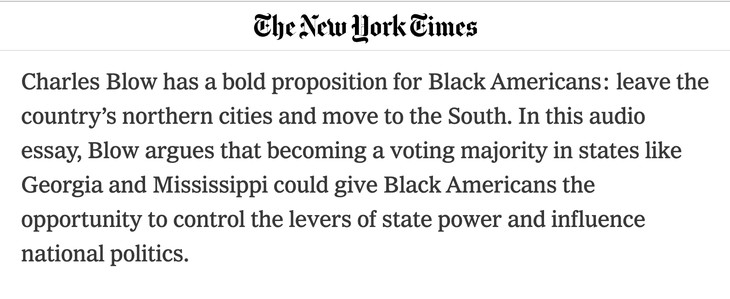“Segregation now, segregation tomorrow, segregation forever.”
Democrat George Wallace became the symbol of the segregationist South in 1963 with that ringing endorsement of racial separatism in his inaugural address.
Elected governor in 1962, Wallace went on to become the third-longest serving governor in America (with non-consecutive terms) and a standard bearer for the Southern Democrats at the height of the civil rights movement. He ran against Lyndon Johnson in 1964 and again for president in 1968, winning 5 states in the election.
In the 1970s Wallace moderated his stance on racial issues, changing with the times. But the times they are a changing again, and a new generation of Democrats has come out in favor of racial separatism.
This time, though, the segregationists are on the Left, not the Right, although it is once again the Democrat Party leading the way. The more things change the more they stay the same.
Charles Blow, one of The New York Times’ Left-leaning columnists, has taken up the George Wallace mantle with an audio essay arguing that Blacks should move back to the South in order to become the racial majority in at least one state.

His argument is as simple as it is racialist: the power of Black voters is dispersed due to the Great Migration of Blacks from the South to Northern states. That migration was the result of the obvious: the South was a terrible place for Blacks in the century following the Civil War, both because of the racist policies of Jim Crow and because the South, being a mainly agricultural economy, had no good paying jobs for Blacks.
With the dispersal of Black voters came the dispersal of Black power he argues. This seems to be a bit counter-intuitive since Blacks were concentrated in the South for over a century and yet their political power was weakest during those decades. Of course, Black political power was suppressed at the time by overt discrimination in a way that is impossible today, but it is difficult to argue that Blacks have not gained political power in the decades since the Civil Rights movement.
In case you haven’t noticed, George Wallace may have retained political power for two decades, but his policies of segregation fell by the wayside, as did his own anti-Black sentiments. In 1982 he won 90% of the Black vote in Deep South Alabama.
Blow, though, is convinced that Blacks would have more political power if they made up over 50% of the population of a state.
My name is Charles Blow. I’m an op-ed columnist at The New York Times. I write about politics, culture, and inequality. And I believe that if Black people simply returned to the South, they could significantly increase their own political power, which has the potential to not only upend the politics of that region, but also of the country as a whole.
There is no way to truly have power in the country if you do not also have access to state power. And there is right now no state in the country where Black people are a majority, and not one where they are projected to be a majority. And that powerlessness is something that I detest. [MUSIC ENDS]
At the end of the Civil War, three Southern states were majority Black. Another three were very close to being majority Black. And it had a tremendous impact on the politics of the region and of the country. But millions of Black people during the Great Migration migrate largely from the rural South to primarily cities in the North and West. [MUSIC PLAYING]
We could argue endlessly about what it might mean for Blacks to “have access to state power,” and to what extent it would change policies in that state. But what you cannot argue is that the premise that race and policy are or should be so deeply intertwined is not essentially different than George Wallace’s argument.
And that is this: race should be a primary determinant of what a person should focus on when voting. Presumably, this is because Blacks and Whites are fundamentally different, at least in their political interests.
If that is the case for Blacks, presumably Blow is saying that should be the case for Whites. At the very least that is the logical extension of his argument.
That is what to me real power looks like. You can have an impact on the presidency. You can have an impact in the Senate. And you can have an impact on all of the power that states wield, everything from writing the criminal code to education to health care.
I have news for Blow and the new segregationists: Blacks only make up 12.1% of the US population according to HHS, and 13.6% according to the census. And as immigration is reshaping the demographics of the country you can expect that percentage to decline as a proportion of the population. Racialized politics is, in the long run, a loser of a policy for Blacks and other minorities.
Whites are still the majority, and if Whites voted as a block would win most elections as Whites are a majority with 59%.

In other words, the political power of Blacks is dependent upon people’s revulsion toward racialized politics and being allies with White liberals in particular.
That Blacks are a voting bloc is arguably a long-term detriment to their continued political power. The Democrat Party still panders to Blacks as a racial group, but as has been seen with their immigration absolutism they take the Black vote for granted. It is hard to say how long Blacks will remain essentially united politically as a group, but objectively speaking the Democrats have a policy of giving lip service to the interests of Blacks while objectively not empowering them to succeed. They offer money and programs, but poverty, crime, and joblessness have not followed the supposedly “pro-Black” policies of the Democrats.
The biggest impact, I believe, of reverse migration happened in Georgia. In 2020, it swung for a Democrat for the first time in decades, and it elected two Democratic senators. The last time that a Democrat had won the state of Georgia was Bill Clinton in 1992.
But the Black population since 1990 doubled in the state of Georgia. It went from 1.7 million Black people to 3.4 million Black people. That meant that their percentages of the electorate went up to about a third. That had a huge impact on that election. And it allowed Black people to be the leading portion of the coalition that swung that state for a Democrat, Joe Biden.
It may take a lot of time, but at some point, Blacks will become a less unified political force. If politics were solely a rational activity it would have long ago happened, but it is obvious that for all people politics is wrapped up in a sense of self. How many Republicans defended George W. Bush long after we knew he was a disaster? I did.
I suspect that many Blacks in Georgia who voted for Biden have yet to decide that Trump would have been a better bet–it’s hard to admit such things–but it’s easy to believe that they regret that Biden became his successor. Given the media spin you might think that the Democrat support for affirmative action would be a boon to Blacks, but objectively speaking it only impacts higher-income Blacks. How many Blacks there are in C-suites or attending Harvard is irrelevant to the average Black voter.
Blow, in other words, is wrong. A majority Black state would likely have little impact long-term on national politics. It might temporarily change the politics of Georgia or Alabama, but in reality, Blacks would be much better off if racialized politics were weakened, not strengthened.
A strong economy, educational competition, and both political parties vying for their votes would empower Blacks much more than increased political segregation.
Integrationist policies should be the future, and segregation should be tossed into the dustbin of history.









Join the conversation as a VIP Member